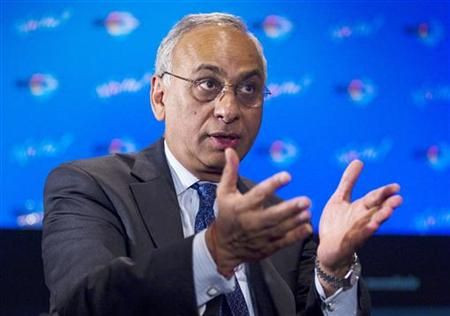S&P President to Step Down; McGraw-Hill Shows its Regret Over Downgrade
Opinion

S&P couldn't take back its U.S. debt rating downgrade that rocked global financial markets. Once it was done, it was done. But now we know the agency embroiled in controversy for two weeks since its Aug. 5 downgrade has met with corporate regret, of some sort at least.
S&P said late Monday that Deven Sharma, its president since 2007, will step down next month. He will be succeeded on Sept. 12 by Citibank Chief Operating Officer Douglas Peterson.
The change in leadership caps two weeks of controversy surrounding S&P since it cut the U.S. debt rating by one notch, to AA+.
Sharma will remain with S&P until the end of the year, working on a strategic portfolio review for the company, it said. But his departure is a clear signal that S&P, owned by parent company McGraw-Hill, knows it goofed, and in a big way.
Perhaps S&P and McGraw-Hill don't regret the downgrade as a single act, but the companies clearly regret how it went down.
Although the Treasury and President Barack Obama questioned the ratings agency's math, citing a $2 trillion calculation error when assessing U.S. debt, the ratings downgrade wasn't completely without merit. The U.S. does have a debt problem -- to the tune of $14.5 trillion.
Also, the U.S. does have a political problem, as noted in the liner notes of S&P's downgrade.
And that, more than anything else, seems to be the point that S&P and McGraw-Hill have come to regret. S&P's downgrade smelled more like a political decision that an unbaised ratings move because of harsh language pointed at Washington used in the downgrade.
Other leading agencies, including Fitch and Moody's, haven't downgraded the U.S. from AAA. In fact, they've recently reaffirmed their AAA ratings on the U.S. But even if S&P was right in its downgrade, the company reached far in making a bold political statement with its action, effectively bashing America's political system before the world.
Certainly, we all know we have a political quagmire in Washington that has deepened in recent months. But that happens in any political season, with a presidential election cranking up. It's not good, but the system is still working, albeit at an annoying crawl that is at times quite dysfunctional.
But S&P, in citing America's risky political system, put the nation's free-voice system on parole. So it wasn't just a downgrade, which would've been problematic in one way, in light of the $2 trillion calculation error. It was the reckless way the downgrade was dished out, bashing the nation before the world.
Most of us couldn't understand why S&P went so far in making a bold political statement with its action. Initially, the agency and its parent, McGraw-Hill, stood by the move. At that point, with a global financial storm swirling, there was no other option.
Two weeks later, however, we now know.
So Sharma is on his way out, and Congressional leaders are preparing to return from recess in early September to deal with America's political and debt problem.
The system keeps working, as it did at S&P and McGraw-Hill.
© Copyright IBTimes 2024. All rights reserved.





















